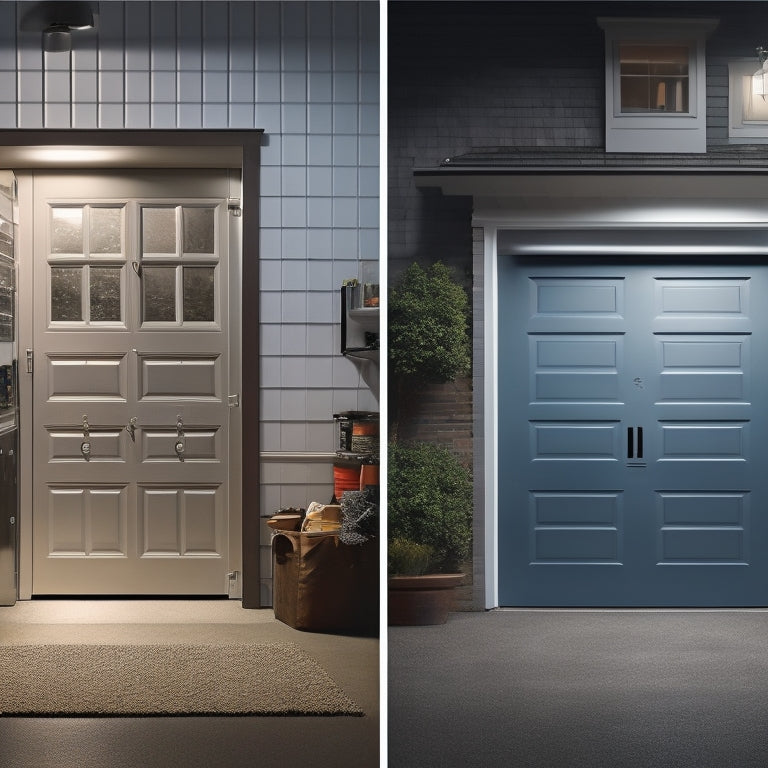
3 Energy-Saving Benefits of Insulated Garage Doors
Share
You can benefit from insulated garage doors in three significant ways: they reduce heat transfer rates, lower your energy consumption costs, and improve temperature regulation. By minimizing heat flow, insulated doors help maintain consistent temperatures, cutting energy bills by up to 20% and your carbon footprint. This temperature stability also prolongs the life of your garage contents and enhances your comfort while working or spending leisure time. With insulated garage doors, you'll enjoy a more comfortable and environmentally friendly space - and there's more to investigate about how they can optimize your garage's energy efficiency.
Key Takeaways
- Insulated garage doors minimize heat transfer rates, reducing energy losses and maintaining consistent temperatures.
- Insulation cuts energy consumption costs by up to 20%, leading to significant cost savings and a lower carbon footprint.
- Insulated doors regulate temperatures, keeping them lower in summer and higher in winter, and prolonging the life of garage contents.
- Thermal insulation enables consistent temperature maintenance, creating a comfortable environment for working or leisure activities.
- Energy-efficient insulated garage doors reduce heat flow, leading to substantial energy savings and a more environmentally friendly garage space.
Reduced Heat Transfer Rate
When it comes to your garage, heat transfer occurs through conduction, convection, and radiation, resulting in energy losses that can greatly impact your energy bills.
This is where thermal insulation comes in – it's an essential component in reducing heat transfer rates. By installing an insulated garage door, you're effectively decreasing the flow of heat into or out of your garage.
Additionally, incorporating renewable energy solutions like solar panels on fleet vehicles can further reduce your carbon footprint. This means you'll no longer be wasting energy to heat or cool your garage, leading to increased energy efficiency.
With an insulated garage door, you'll experience a significant reduction in heat transfer, allowing you to maintain a consistent temperature and enjoy the benefits of energy savings.
Lower Energy Consumption Costs
By slashing heat transfer rates, you'll cut your energy consumption costs considerably.
Insulated garage doors are designed to reduce heat transfer, which directly impacts your energy bills. The cost efficiency of these doors lies in their ability to minimize heat loss during winter and heat gain during summer. This results in lower energy consumption, which translates to lower costs.
Additionally, optimizing solar panel array design optimal energy generation and selecting energy-efficient charging equipment can further reduce energy consumption.
Some benefits of insulated garage doors include:
- Reduced energy consumption by up to 20%
- Lower energy bills, resulting in significant cost savings
- Increased comfort and reduced temperature fluctuations
- Environmentally friendly, as reduced energy consumption leads to a reduced carbon footprint
Improved Temperature Regulation
Take control of your garage's climate with insulated doors that regulate temperature more effectively. By reducing heat transfer, insulated doors maintain a consistent temperature, providing a more comfortable working environment. This temperature stability also helps to prolong the life of your garage's contents, including cars, tools, and equipment.
| Season | Insulated Door | Non-Insulated Door |
|---|---|---|
| Summer | 75°F (24°C) | 90°F (32°C) |
| Winter | 60°F (16°C) | 40°F (4°C) |
| Spring | 65°F (18°C) | 70°F (21°C) |
| Fall | 55°F (13°C) | 50°F (10°C) |
With climate control, you can enjoy a more stable and comfortable garage environment, perfect for working on projects or simply spending time in your garage. Insulated doors provide the freedom to use your garage as you wish, without worrying about extreme temperatures.
Frequently Asked Questions
Can Insulated Garage Doors Be Installed on Existing Garage Door Openings?
You can install insulated garage doors on existing garage door openings, but you'll need to assess the existing structure's compatibility with the new door's installation process, ensuring a seamless and secure fit.
Are Insulated Garage Doors Compatible With Automatic Garage Door Openers?
"When in doubt, throw it out" - don't worry, you won't have to ditch your automatic opener. You'll find insulated garage doors are compatible with most opener types, but double-check compatibility concerns to guarantee a smooth installation process.
Do Insulated Garage Doors Require More Maintenance Than Non-Insulated Doors?
You'll find that insulated garage doors don't necessarily require more maintenance than non-insulated ones, but you'll need to check the insulation performance regularly to guarantee it's doing its job, which might increase maintenance frequency slightly.
Can I Install an Insulated Garage Door Myself, or Do I Need a Professional?
Daring DIY enthusiasts, explore the details: installing an insulated garage door demands diligence, as intimidating installation challenges await. Make certain you're equipped with the right DIY tools and technical know-how to tackle the task, or consider consulting a professional for precise results.
Are There Different Insulation Materials Available for Garage Doors?
You'll find various insulation types for garage doors, each offering distinct thermal performance. You can choose from foam board, reflective insulation, fiberglass batts, or spray foam, each with its own R-value and installation requirements, giving you the freedom to select the best fit for your needs.
Related Posts
-

Why Choose Cool Roofs in Scorching Climates?
You opt for cool roofs in scorching climates because they enable you to reclaim control over your energy consumption ...
-

Why Transform Human Waste Into Garden Gold?
By changing human waste into garden gold, you'll reduce waste management costs, support sustainable agriculture, and ...
-

What Are Natural Clay Paints for Green Home Interiors?
You're about to uncover a game-changing alternative to synthetic paints that not only enhances the aesthetic of your ...


